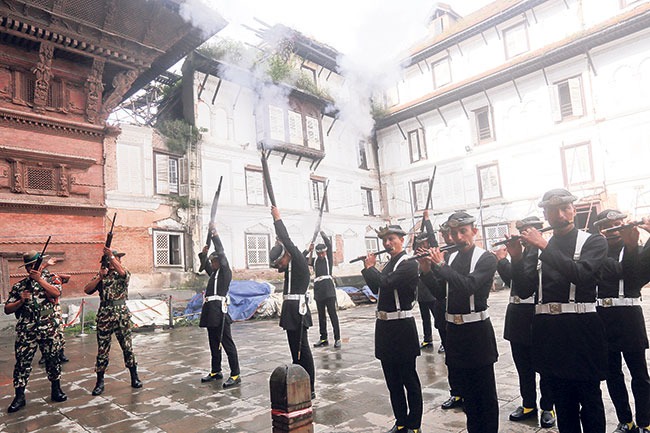KATHMANDU, Sept 21: With Ghatasthapana begins the biggest and most celebrated festival among Hindus in Nepal. Ghatasthapana falls on Ashwin Shukla Pratibada or the first day of the waxing moon. This year, Ghatasthapana falls on September 21 and the nation is gearing up to welcome the Bada Dashain festival.
People, regardless of their social and economic status, indulge in celebrating this one festival as lavishly as possible, while people of all age can be seen waiting for Dashain with equal enthusiasm.
Ghata means clay pot and sthapana translates to establish. On this day, people perform puja and sow seeds of barley, typically in a clay pot. If not barley, they sow seeds of wheat, corn and rice at their homes, temples and workplaces in accordance with the Vedic tradition.
The Nepal Panchanga Nirnayak Samiti has determined 6:56 am to 7:54 am as the auspicious time to plant the seeds on Ghatasthapana this year. It is not necessary that one performs puja at the determined time, but it is believed that the right star alignment would bring prosperity and luck.
The legend of power play

 According to senior cultural historian Dr Jagman Gurung, in some festivals people establish and worship idols (iconic worship) whereas in other festivals and places, people worship stone, mud statue, akshata (rice grains) and kalash (metal jar), un-iconic worship. Ghatasthapana falls on the latter part of the celebration.
According to senior cultural historian Dr Jagman Gurung, in some festivals people establish and worship idols (iconic worship) whereas in other festivals and places, people worship stone, mud statue, akshata (rice grains) and kalash (metal jar), un-iconic worship. Ghatasthapana falls on the latter part of the celebration.
“It is not sure where or when the culture of Ghatasthapana first started. But what we know is that it is taken as an attempt to test the soil’s fertility. Some sow the seeds in rato mato (red mud) or sand chanting vedic mantras,” Gurung added.
A pot from Taleju Bhawani Temple is brought to Hanumandhoka to offer holy water to Goddess Durga. It is covered and decorated with akshata and flowers. The kalash is then covered with a red cloth and worshipped before sowing the barley seeds.
Some also sow the seeds in a plate made of betel nuts leaves while others prefer a sand bed or a pot filled with sand. The barley seeds are watered and worshipped for ten days. “Vedic mantras chanted during the puja include Navaran mantra, also known as nine-letter mantra, offered to Mahakali/Mahalaxmi/Mahasaraswoti,” informed Gurung.
The seeds planted are then kept in a dark and cool place. The yellow sprouts (jamara) are also taken as the herbal medicine for blood pressure and diabetes. Ghatasthapana is also the day when Navaratri starts. Navaratri extends for nine consecutive days where nine incarnations of Goddess Durga are worshipped by the devotees.
The tenth day Dashami, also called Vijaya Dashami, is celebrated as the day of victory over evil. According to the Hindu mythology, this is the day when Goddess Durga had killed the demon king, Mahishasur.
Also on the day, the barley sprouts called jamara is cut. Some people also relate the sprouts with prosperity. Young members of the family receive jamara with red tika and money or fruits from the hands of the elders as blessings.
Unlike at other places, people sow barley seeds on the eve of Ghatasthapana, which is then offered on Nawami (the ninth day) during the Kot Puja in Yanjakot of Kaski. On the day of Ghatasthapana, they plant seeds in their respective houses and then perform the Nagara Puja. A katuwal bangs drums around the village to announce that Dashain has arrived.


































